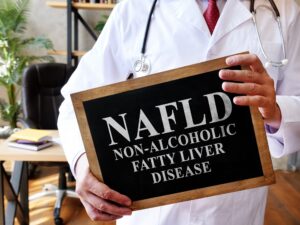
A study published in Neurology found that people with a buildup of fat cells in the liver caused by NAFLD were more likely to develop dementia than those without the disease. If you have NAFLD, it’s important to be aware of this increased risk and take steps to protect your brain health. Talk to your doctor about ways to lower your risk for dementia, including following a healthy diet and exercising regularly.
According to the World Health Organization, non-alcoholic fatty liver disease is a major public health problem that affects up to 25% of people worldwide. NAFLD is the most common chronic form of liver disease and is often asymptomatic, meaning that many people don’t know they have it.
The leading cause of NAFLD is an excess of fat in the liver. This can be due to various factors, including obesity, insulin resistance, high blood pressure, and diabetes. In a small percentage of people, NAFLD can lead to liver inflammation or damage.
While NAFLD is not currently curable, some treatments can help improve symptoms and prevent disease progression. With early diagnosis and treatment, many people with NAFLD can live long and healthy lives.
For the study, researchers analyzed 30 years of national Swedish patient registry records to find 2,898 people 65 and older who were diagnosed with non-alcoholic fatty liver disease. An additional 28,357 people without the disease were also identified and matched for age, sex, and city of residence at the age of diagnosis.
It was found that after five years of follow-up, 145 people (5%) with non-alcoholic fatty liver disease were diagnosed with dementia compared to 1,291 people (4.6%) without liver disease.
Cardiovascular risk factors, including high blood pressure and type 2 diabetes, were accounted for. Researchers found that compared to people without liver disease, people with non-alcoholic fatty liver disease had a 38% higher rate of dementia overall.
When researchers specifically looked at vascular dementia caused by inadequate blood flow to the brain, people with non-alcoholic fatty liver disease had a 44% higher rate than people without liver disease. People with liver disease and heart disease had a 50% greater chance of dementia, and those with liver disease and stroke had a 2.5 times greater risk. Researchers did not find a higher rate of Alzheimer’s disease.
These results highlight the possible need for targeted treatment of liver disease and co-occurring cardiovascular disease to help reduce the risk of dementia.
Healthy Liver and Brain Function
As one of the most important organs in the human body, the liver works 24 hours a day to produce and process many of the chemicals the body requires. It processes over 500 functions, including hormone production, bile secretion, and converting sugars into glycogen.
Liver Rescue is a formula designed to support and maximize the performance of a healthy liver through its 7 ingredients. These powerful ingredients can help fight free radicals, improve bile production, remove toxins, and give your liver the support it deserves.
While some degree of cognitive decline is nearly inevitable as you age, this study shows how other factors can take a toll on the ability of the brain to function at peak potential. This can affect memory, concentration, and overall brain function.
The Smart Pill can help to enhance cognitive function and memory through 9 ingredients that help to support, nourish, and maximize brain health. These include ginkgo Biloba, huperzine A, bacopa extract, rosemary extract, and a B vitamin complex. The formulation of these ingredients is an excellent way to help fight free radicals, boost circulation, and provide nutritional support to assist with cognitive function.